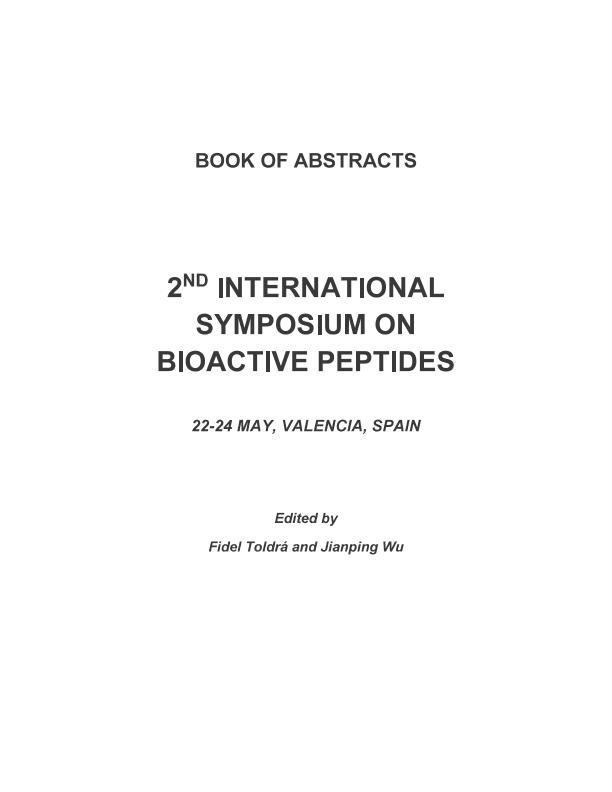Mostrar el registro sencillo del ítem
dc.contributor.author
Nardo, Agustina Estefania

dc.contributor.author
Añon, Maria Cristina

dc.contributor.author
Quiroga, Alejandra Viviana

dc.contributor.other
Toldrá, Fidel
dc.date.available
2022-11-24T13:01:41Z
dc.date.issued
2019
dc.identifier.citation
A a new docking approach to find peptides renin inhibitors derived from food proteins; 2nd International Symposium on Bioactive Peptides; Valencia; España; 2019; 70-70
dc.identifier.uri
http://hdl.handle.net/11336/178799
dc.description.abstract
Structure-based computer modeling of peptide-protein interactions is a core component of modern bioinformatics approach to study bioactive peptide. Molecular docking is the most common technique used to predict the predominant binding mode(s) of a ligand with a protein of known three-dimensional structure. Most of docking programs, like AutoDock, are successful to work with small peptides but not with larger ones due to its high flexibility and freedom of movement. The objective of this work was to try out new free, friendly and rigorous servers developed specifically for peptides that act as ligands to predict with greater confidence the best peptides that could potentially act as inhibitors of an enzyme. For this purpose we use six peptides (SFNLPILR; FNLPILR; SFNLPIL; QAFEDGFEWVSFK; AFEDGFEWVSFK; VNVDDPSKA) identified in an amaranth alcalase hydrolyzate (HD 21±4 %) as renin (EC 3.4.23.15) inhibitors. As controls the renin substrate (angiotensinogen), a competitive inhibitor (IRLIIVLMPILMA, IC50=6.5 mM) and a tridecapeptide of alanines were used. In a first stage, CABS dock server (http://biocomp.chem.uw.edu.pl/CABSdock) was use to generate the peptide-renin (PDB 2V0Z chain C) complex and identify the most likely interaction sites. In the second stage, FlexPepDock server (http://flexpepdock.furmanlab.cs.huji.ac.il/) was used to refine the interaction energy of the complex and calculate a score that serves to select the best inhibitors from the set of peptides used. Comparing the obtained means of three independent replicates of the FlexPepDock score the peptides AFEDGFEWVSFK and SFNLPILR had a similar interaction energy to as control IRLIIVLMPILMA (Tukey test, p=0.05). Both peptides were synthesized to evaluate its inhibitory activity in vitro. The docking using peptide remains to be a challenge for the scientific community, the protocol used in this work use new servers specifically developed for this purpose with the additional advantage of being fast implementation and friendly with experimental scientists.
dc.format
application/pdf
dc.language.iso
eng
dc.publisher
Universitat de València
dc.rights
info:eu-repo/semantics/openAccess
dc.rights.uri
https://creativecommons.org/licenses/by-nc-sa/2.5/ar/
dc.subject
DOCKING APPROACH
dc.subject
RENIN INHIBITORS
dc.subject
PEPTIDES
dc.subject
AMARANTH
dc.subject.classification
Alimentos y Bebidas

dc.subject.classification
Otras Ingenierías y Tecnologías

dc.subject.classification
INGENIERÍAS Y TECNOLOGÍAS

dc.title
A a new docking approach to find peptides renin inhibitors derived from food proteins
dc.type
info:eu-repo/semantics/publishedVersion
dc.type
info:eu-repo/semantics/conferenceObject
dc.type
info:ar-repo/semantics/documento de conferencia
dc.date.updated
2022-11-01T22:15:16Z
dc.journal.pagination
70-70
dc.journal.pais
España

dc.journal.ciudad
valencia
dc.description.fil
Fil: Nardo, Agustina Estefania. Provincia de Buenos Aires. Gobernación. Comisión de Investigaciones Científicas. Centro de Investigación y Desarrollo en Criotecnología de Alimentos. Consejo Nacional de Investigaciones Científicas y Técnicas. Centro Científico Tecnológico Conicet - La Plata. Centro de Investigación y Desarrollo en Criotecnología de Alimentos. Universidad Nacional de La Plata. Facultad de Ciencias Exactas. Centro de Investigación y Desarrollo en Criotecnología de Alimentos; Argentina
dc.description.fil
Fil: Añon, Maria Cristina. Provincia de Buenos Aires. Gobernación. Comisión de Investigaciones Científicas. Centro de Investigación y Desarrollo en Criotecnología de Alimentos. Consejo Nacional de Investigaciones Científicas y Técnicas. Centro Científico Tecnológico Conicet - La Plata. Centro de Investigación y Desarrollo en Criotecnología de Alimentos. Universidad Nacional de La Plata. Facultad de Ciencias Exactas. Centro de Investigación y Desarrollo en Criotecnología de Alimentos; Argentina
dc.description.fil
Fil: Quiroga, Alejandra Viviana. Provincia de Buenos Aires. Gobernación. Comisión de Investigaciones Científicas. Centro de Investigación y Desarrollo en Criotecnología de Alimentos. Consejo Nacional de Investigaciones Científicas y Técnicas. Centro Científico Tecnológico Conicet - La Plata. Centro de Investigación y Desarrollo en Criotecnología de Alimentos. Universidad Nacional de La Plata. Facultad de Ciencias Exactas. Centro de Investigación y Desarrollo en Criotecnología de Alimentos; Argentina
dc.relation.alternativeid
info:eu-repo/semantics/altIdentifier/url/https://congresos.adeituv.es/bioactivepeptides/ficha.en.html
dc.conicet.rol
Autor

dc.conicet.rol
Autor

dc.conicet.rol
Autor

dc.coverage
Internacional
dc.type.subtype
Simposio
dc.description.nombreEvento
2nd International Symposium on Bioactive Peptides
dc.date.evento
2019-05-22
dc.description.ciudadEvento
Valencia
dc.description.paisEvento
España

dc.type.publicacion
Book
dc.description.institucionOrganizadora
Consejo Superior de Investigaciones Científicas. Instituto de Agroquímica y Tecnología de Alimentos
dc.description.institucionOrganizadora
University of Alberta.Department of Agricultural, Food and Nutritional Science
dc.source.libro
Book of Abstracts: 2nd International Symposium on bioactive Peptides
dc.date.eventoHasta
2019-05-24
dc.type
Simposio
Archivos asociados
